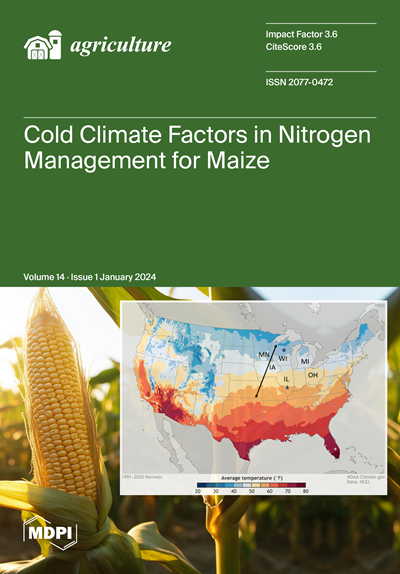意大利南部草莓生产的环境与经济分析
IF 3.6
2区 农林科学
Q1 AGRONOMY
引用次数: 0
摘要
本文旨在对意大利南部坎帕尼亚和巴西利卡塔地区草莓种植的环境和经济方面进行评估,并考虑施用堆肥茶(CT)对草莓产量的影响。对八种草莓种植系统进行了测试。为此,介绍了堆肥茶的生产和特性;对草莓的产量进行了定量分析,并利用生命周期评估方法估计了每公顷和每公斤草莓的环境影响。为了比较所分析的系统的盈利能力,计算了农民的毛利润,同时考虑了污染的社会成本。所分析的两种有机系统之一,使用日光进行土壤消毒,生物对抗害虫,并在使用寿命结束时回收瓦楞纸箱作为包装,是具有碳信用的最可持续的系统。与此同时,如果像分析的另一个有机系统那样进行大量的灌溉和施肥干预,有机作物并不总是最可持续和最有利可图的系统。在几乎所有分析系统中,塑料材料和锌结构是影响最大的项目。使用具有高抑制作用的有益微生物数量增加的CT,可以在使用它的两个系统中获得良好的产量增加,并获得更高的毛利润。另一方面,这项技术的有效性与发现高质量的绿色堆肥密切相关。本文章由计算机程序翻译,如有差异,请以英文原文为准。
An Environmental and Economic Analysis of Strawberry Production in Southern Italy
This paper aims to provide an evaluation of the environmental and economic aspects of strawberry cultivation in the Campania and Basilicata regions of Southern Italy, and to consider the effects on strawberry productivity following compost tea (CT) application. Eight strawberry-growing systems were tested. To this end, compost tea production and characterization were described; a quantitative analysis of the strawberries’ yield was performed, and environmental impact per ha and per kg of strawberries was estimated using the life cycle assessment methodology. To compare the profitability of the systems analyzed, the gross profit of the farmers was calculated, also considering the social cost of pollution. One of the two organic systems analyzed, using solarization for soil disinfestation, biological fight for pest control, and corrugated boxes as packaging recycled at the end-of-life, was the most sustainable system with carbon credits. At the same time, organic crops are not always the most sustainable and profitable systems if significant irrigation and fertigation interventions are carried out, as in another organic system analyzed. Plastic materials and zinc structures were the most impacting items in almost all analyzed systems. The use of a CT with an elevated number of beneficial microorganisms with a high suppressive action allowed to obtain a good increase of the yield, in both systems that used it, and to have a higher gross profit. On the other hand, the validity of this technique was strongly linked to the finding of high-quality green compost.
求助全文
通过发布文献求助,成功后即可免费获取论文全文。
去求助
来源期刊

Agriculture-Basel
Agricultural and Biological Sciences-Food Science
CiteScore
4.90
自引率
13.90%
发文量
1793
审稿时长
11 weeks
期刊介绍:
Agriculture (ISSN 2077-0472) is an international and cross-disciplinary scholarly and scientific open access journal on the science of cultivating the soil, growing, harvesting crops, and raising livestock. We will aim to look at production, processing, marketing and use of foods, fibers, plants and animals. The journal Agriculturewill publish reviews, regular research papers, communications and short notes, and there is no restriction on the length of the papers. Our aim is to encourage scientists to publish their experimental and theoretical research in as much detail as possible. Full experimental and/or methodical details must be provided for research articles.
 求助内容:
求助内容: 应助结果提醒方式:
应助结果提醒方式:


